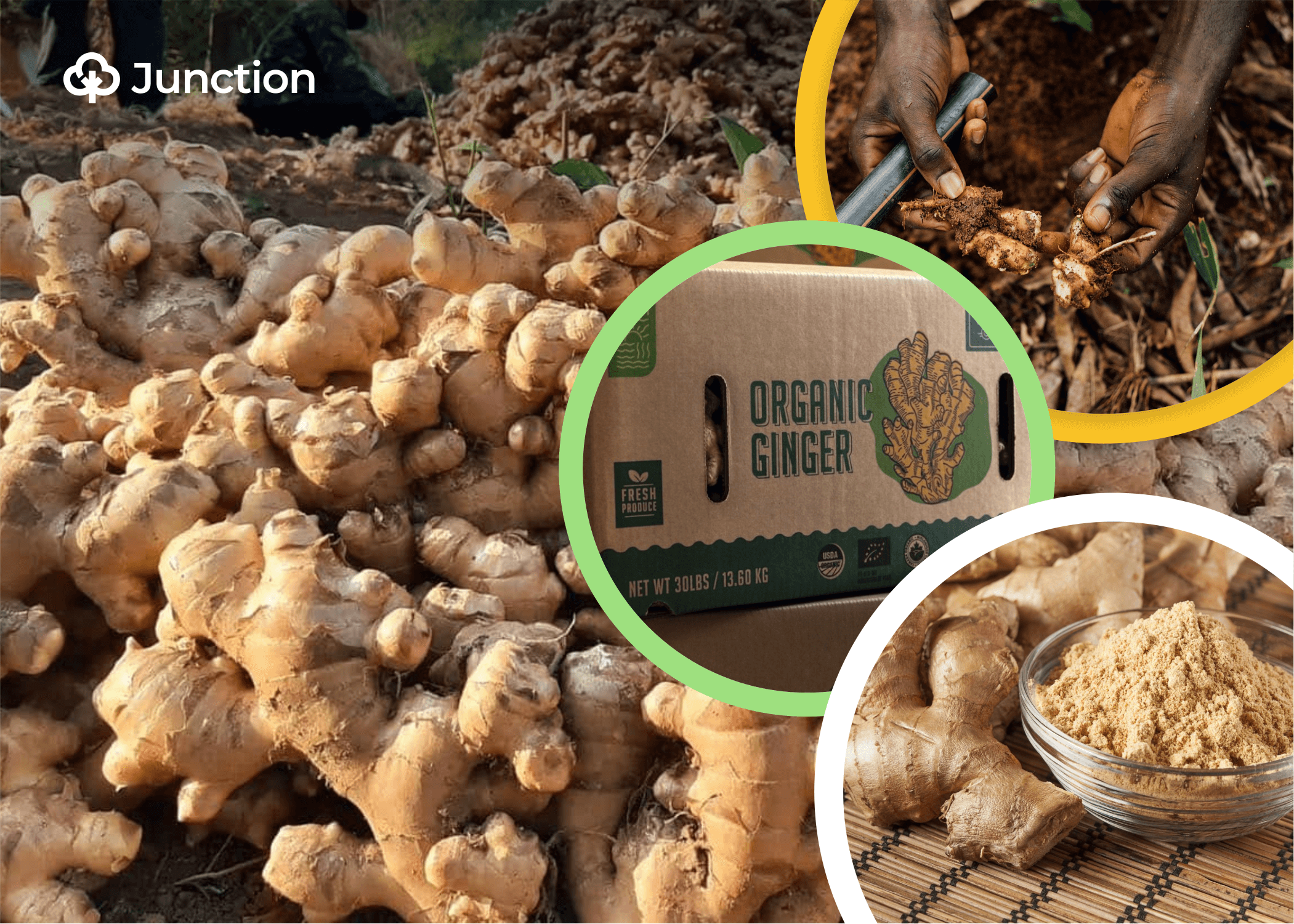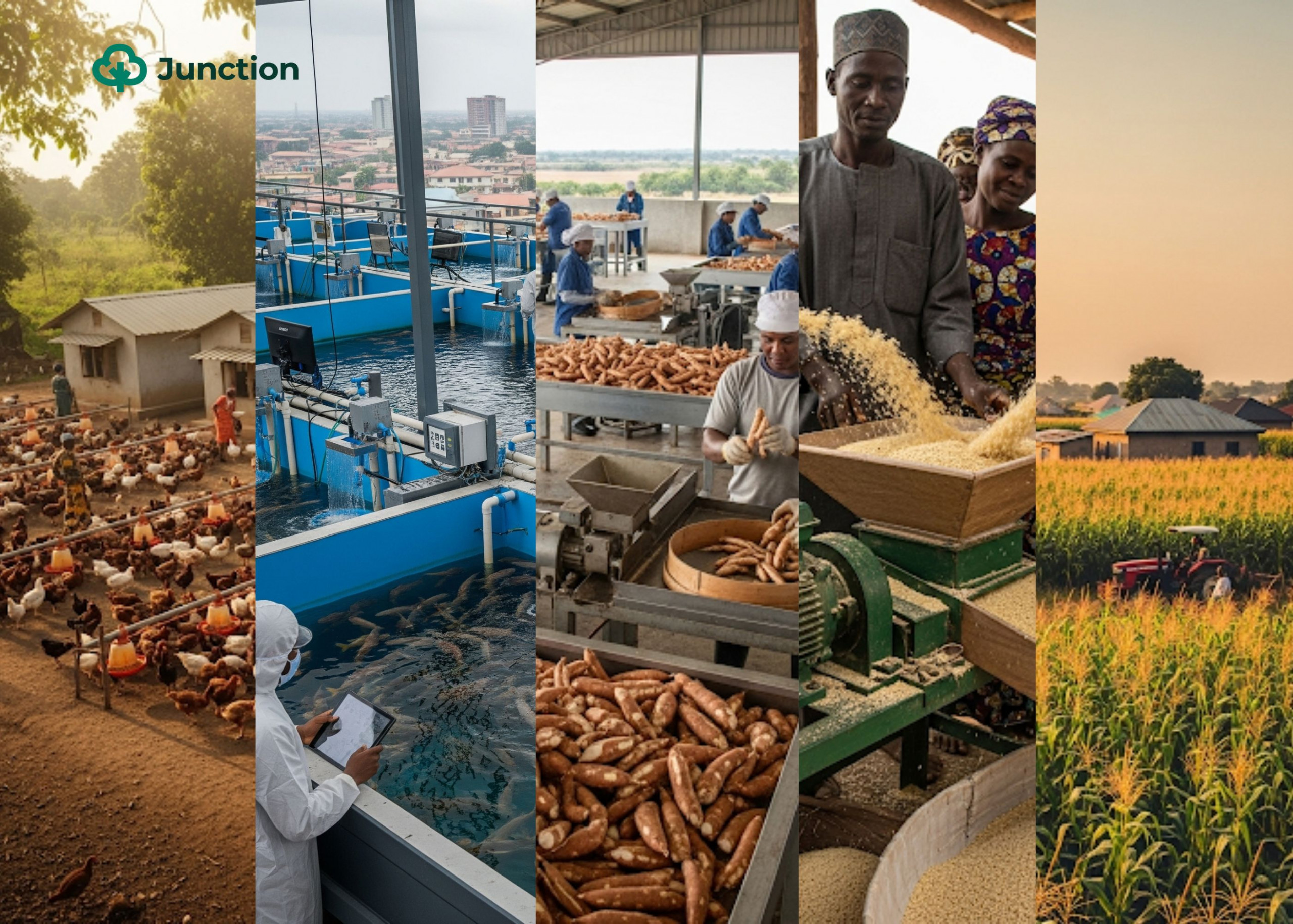Ginger is an indispensable ingredient in many Nigerian cuisines. Tomato stew, a popular sauce for eating rice and other starchy staples, owes its fiery taste to ginger. Ginger is present in ‘yaji’, a northern Nigerian special spice combo that is used in meal preparation.
Beyond its culinary significance, ginger holds cultural importance too. It often symbolises warmth, vitality, and good health. It is used in traditional medicine to treat various ailments like cold and cough, reflecting its deep-rooted place in Nigerian society.
Ginger cultivation presents a golden opportunity for Nigerian farmers to boost their income and improve their livelihoods. With a robust domestic market and a growing global demand for spices, ginger farming offers a reliable source of revenue, as the next section will show.
By diversifying their crops and incorporating ginger into their agricultural practices, farmers can enhance their resilience to market fluctuations and reduce their reliance on traditional, less profitable crops. Moreover, its potential for export opens up new markets and opportunities for increased earnings.
In this article, you will also learn why ginger has an advantage over crops like yam and cassava, which are heavily cultivated by millions of smallholder farmers. Additionally, you will see how more ginger production can lead to the development of supporting industries while stimulating economic growth within rural communities.
A lucrative market for ginger
At home and abroad, almost everyone consumes ginger in one form or the other. The product offers a versatile flavour profile that ranges from pungent to subtly sweet. The demand for ginger is particularly high during festive seasons and celebrations, as it is a key component in many traditional dishes and drinks.

The increasing population and urbanisation in Nigeria have contributed to a steady growth in the domestic demand for ginger. Also, the burgeoning food and beverage industry, including restaurants, hotels, and food processing companies, relies heavily on ginger as a flavouring agent.
This consistent and substantial domestic market provides a solid foundation for ginger farmers, ensuring a steady offtake of their produce and mitigating risks associated with export-oriented agriculture.
On the international scene, ginger is a billion dollar market with China leading by a very large margin, exporting over $400 million annually. Nigeria currently ranks fifth and shipped $69 million worth of the product (in crushed, ground and other forms) in 2022. Clearly, there is a still a huge opportunity for Nigerian farmers to earn income from producing more of this crop.
Ginger’s resilience
Although majorly produced in Northern states of Nigeria like Kaduna and Nasarawa, gingr can thrive in several other places in Southern Nigeria as well. It is resilient and relatively undemanding in terms of soil conditions.
It can grow in a wide range of soil types, from sandy to clay loam, as long as the soil is well-drained. This adaptability makes ginger cultivation feasible for farmers across Nigeria, regardless of their specific soil characteristics.
Nigeria’s diverse climatic zones and fertile soils provide an ideal environment for ginger cultivation. The country’s tropical climate, characterised by high temperatures and humidity, is well-suited to ginger’s growth requirements. Whether it’s the coastal lowlands or the upland regions, ginger can thrive in different agro-ecological zones.
In addition, cultivating the crop does not require special inputs that will increase the cost of production. Initial investments involve typical items like labour, land lease, agrochemicals, and more. See this one pager business plan to learn more about investment requirements of ginger production.
Ginger can play a crucial role in enhancing soil health and optimising crop rotation systems. Its deep root system effectively breaks up compacted soil, improving its structure and aeration. Also, its residues, including its rhizomes and stalks, contribute significant organic matter to the soil, increasing its fertility and water-holding capacity. By incorporating ginger into crop rotation, farmers can reduce the incidence of soil-borne pests and diseases, as it disrupts their life cycles. Furthermore, it has allelopathic properties that can suppress the growth of certain weeds, minimising competition for nutrients and water with subsequent crops. It is the perfect crop to break soil routine if you have been growing other crops on the land before.
Economic benefits
While cocoa beans remains the most highly priced agricultural commodity in Nigeria (at about ₦13,000 per kilogram), ginger farmers have the potential to earn considerable income from their venture. According to statistics from the Food and Agricultural Organisation (FAO), Nigeria’s ginger yield per hectare outperforms the top four most exported agricultural commodities by quite a wide margin.

With more yields than the rest of the commodites stacked against it in the chart above, ginger farmers can make up the pricing gap between them with more produce.
Also, adding value to earn more income can present employment opportunities in drying, processing, packaging, and distribution, leading to increased economic activity in rural areas. This move will be similar to what sesame exporters do in cleaning their products or soya beans producers in processing their produce into flour.
So, beyond direct income generation, ginger farming can contribute to the overall development of rural communities. The formation of farmer cooperatives or associations can empower producers to collectively negotiate better prices, access more markets, and share knowledge and resources.
Challenges (business opportunities)
Ginger farmers in Nigeria encounter numerous challenges that hinder their productivity and profitability. One of the most significant issues is the lack of access to quality planting materials, as many farmers rely on low-yielding and disease-prone varieties.
Another issue is the absence of proper storage facilities which leads to post-harvest losses, reducing farmers’ income. There is also a lack of adequate infrastructure in rural areas, including poor roads and limited access to markets, which hampers the transportation and sale of ginger produce. These factors, combined with the high cost of farm inputs such as fertilisers and pesticides, contribute to the low income levels of many ginger farmers.
Another major challenge faced by ginger farmers is the prevalence of pests and diseases, such as ginger blight, which can cause significant yield losses. For example, in 2023, the minister of state for agriculture and food security, Sabi Abdullahi, revealed that farmers ginger farmers have incurred losses of approximately ₦12 billion due to the blight. While the minister added that the government, through the National Agriculture Development Fund (NADFund), provided a ₦1.6 billion recovery package for farmers, the loss of revenue is staggering.
Climate change, with erratic rainfall patterns and increasing temperatures, threatens the livelihoods of ginger farmers because the crop is sensitive to both drought and excessive moisture.

These challenges can be opportunities for businesses (in the private and public sectors) to spring forth in the value chain to:
- Enhance access to quality planting materials through seed multiplication centers and distribution networks. This will involve developing high-yielding, disease-resistant ginger varieties and providing farmers with certified seedlings at affordable prices. Additionally, investing in research and development to create improved ginger cultivars can significantly boost productivity.
- Mitigate post-harvest losses through storage facilities equipped with temperature and humidity control systems. These facilities, when presented at a reasonable cost, can help farmers preserve ginger quality and extend its shelf life.
- Process ginger into products like ginger powder, oil, and extracts which will increase farmers’ incomes and reduce post-harvest waste.
- Improve market access through offtaker centers in rural areas which give farmers a guaranteed market for their produce and eliminate the need for long transportation distances.
- Address the challenges posed by pests, diseases, and climate change through integrated pest management services, including the provision of bio-pesticides and crop rotation advice. Supplying climate-smart agricultural technologies such as irrigation systems and drought-resistant varieties at affordable prices will solve climate change challenges.
- Provide farmers with access to agricultural insurance to help mitigate risks associated with crop failures due to adverse weather conditions.
Encouraging more people to plant ginger
The Nigerian government can do more in encouraging more farmers to take up ginger production through support and effective policies.
Implementing favourable policies can create an enabling environment for farmers to thrive. Also, they can invest in agricultural research and extension services to develop improved ginger varieties, promote best practices, and disseminate essential information to farmers.
Additionally, they can provide subsidies on farm inputs to reduce production costs for farmers. Furthermore, the government can facilitate access to credit and financial services through dedicated agricultural credit schemes to empower farmers to invest in their businesses.
Infrastructure development is another key area where government intervention is essential. Constructing and maintaining rural roads, storage facilities, and processing plants can enhance the efficiency of ginger value chains.
Developing markets can improve farmers access on the domestic and international scenes. They can also protect farmers’ rights and ensure fair pricing to create a level playing field for all stakeholders. Through targeted support and well-crafted policies, the government can contribute to the overall growth and sustainability of the ginger farming sector in Nigeria.
Conclusion
There is a plethora of advantages that ginger farming presents to farmers through direct income, rural communities through employment opportunities, and the country’s economy through international trade.
It is crucial that stakeholders in the private and public sectors take the reins to solve the problems that plague existing producers. They should also create systems that encourage new crop of farmers to step into the industry.
Not limited to farmers, enterpreneurs should seek opportunities along the value chain to set up businesses as well.



